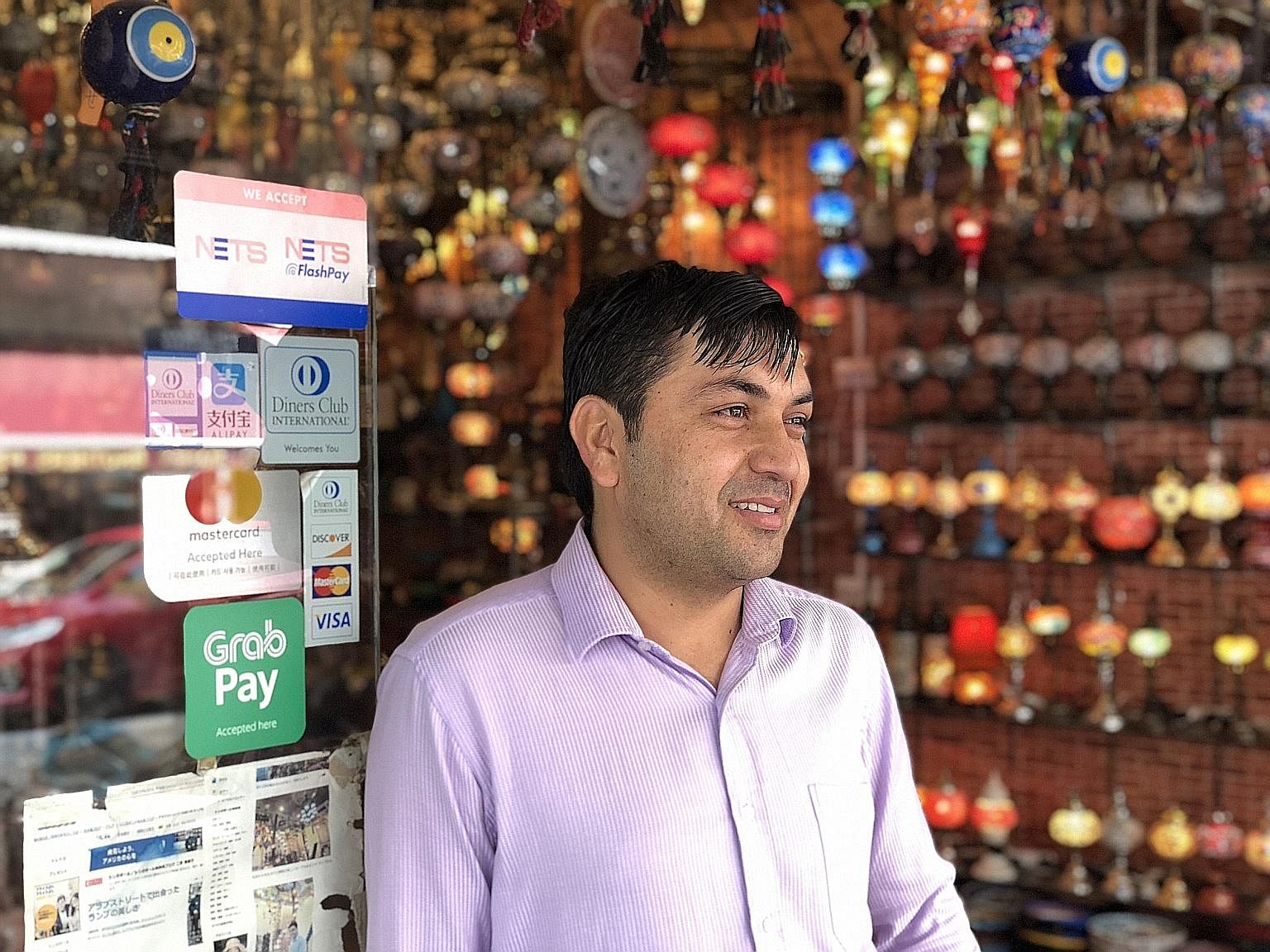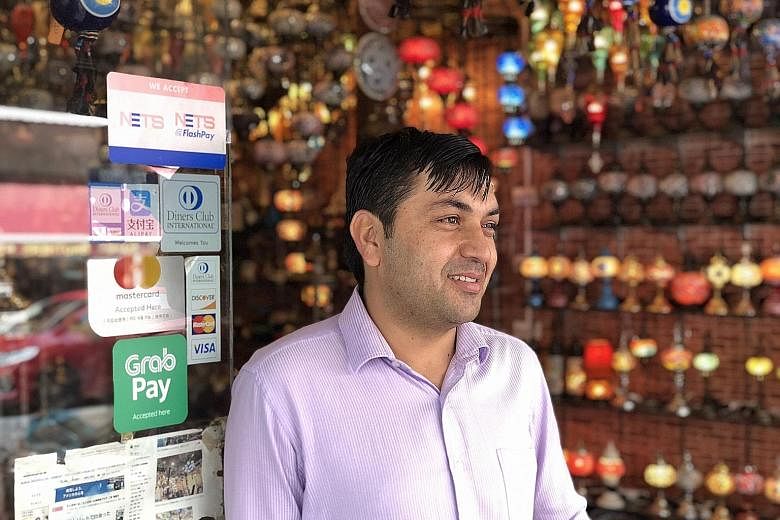Today, Grab is well known in many South-east Asian countries as the go-to app for ride hailing. Soon, the Singapore-headquartered company may do much more than helping commuters travel from point to point.
Grab chief executive officer Anthony Tan announced on July 10 a new service - GrabPlatform - that allows other businesses, from grocery sellers to insurance agencies, to incorporate its payment system, GrabPay, into their apps and websites for electronic payments.
In an interview with Bloomberg earlier this month, Mr Tan said he wants Grab to become an "everyday super-app" that helps millions of users carry out daily activities.
If Grab, incorporated just six years ago, succeeds in creating an ecosystem that allows almost any business to ride on GrabPay, the company with an app that is downloaded on more than 100 million mobile devices across eight countries in Asean may be well on its way to becoming one of the region's largest payment providers.
Not to be outdone, many established financial institutions here and around the world are also ramping up their offerings in digital financial services like peer-to-peer payment and personal finance advisory within their mobile banking apps.
The Straits Times looks at how fintech, or financial technology, is set to change Singapore's financial services sector and finance jobs as we know it.
Q What is fintech?
A Fintech refers to the use of innovative technology to provide, enable and enhance financial services such as payment, money transfer, insurance, fund raising and so on.

Q What kinds of fintech products are there?
A The most prolific fintech products are those that offer payment and fund transfer solutions.
These products, which include the likes of PayPal, GrabPay and PayNow, aim to enhance the experience of exchanging money and paying for goods bought online or from brick-and-mortar stores.
PayNow, a peer-to-peer fund transfer service integrated into the digital banking platforms of participating banks, has signed up more than 1.4 million users and processed over $900 million as of last month, since it was launched in July last year. From next month, PayNow customers can also use the service to pay bills, as well as receive salaries from their employers.
Fintech apps that offer moneylending services are also encroaching on territory traditionally occupied by big banks. Such apps may use big data and artificial intelligence (AI) to build a much more accurate picture of someone's credit profile, or his ability to repay a loan. As such, these apps can serve potential borrowers who are otherwise ignored by larger financial institutions.
Then there are fintech investment apps that draw customers by simplifying a seemingly complex activity, such as investing, through more intuitively designed interfaces.
For example, Singapore fintech start-up Stashaway has an app that gets customers to enter their financial goal - such as saving $10,000 in five years - and a graph plotted by AI, or robo-advisers, will suggest how much money they should be depositing into their accounts every month. Other fintech applications include insurance services, cryptocurrency trading and crowdfunding platforms.
Q Why is fintech a big deal?
A If "money makes the world go round", then fintech has the potential to transform how the world operates.
Any activity that involves the exchange of money, whether it is ordering food, shopping for new clothes or getting a loan, can potentially be enhanced by fintech. As fintech solutions are not constrained by geographical borders, businesses that tap fintech services can capture customers from across the globe.
-
About the quiz
-

On Mondays, this paper's journalists will address burning questions in the Opinion section, offering unique Singaporean perspectives on complex issues. The segment started in April, and ends on Aug 6.The primers are part of the outreach of The Straits Times-Ministry of Education National Current Affairs Quiz, or The Big Quiz, which aims to promote an understanding of local and global issues among pre-university students.
The primers will broach contemporary issues, such as energy security and sustainability in food and water. Other topics include an examination of how big data and analytics will affect the way people live and work in the future.
Each primer topic will give a local perspective to help students draw links back to the issues' implications for Singaporeans.
For the first time, The Big Quiz will go online, allowing all pre-university students to take part in the current affairs competition over three online quiz rounds.
The online quizzes are based on the primer topics that preceded each round, and will be available for two weeks from the start date of each quiz.
The third and final quiz round will be on Aug 6. Watch this space for more information on how to take The Big Quiz Online.
The nationwide event is jointly organised by The Straits Times and the Ministry of Education, with Singapore Press Holdings Foundation as its presenting sponsor.
For more information or to view the other primers in The Big Quiz series, go to: https://www.straitstimes.com/tags/the-big-quiz
Countries that can harness the growth of fintech-enabled businesses could also reap massive economic rewards. According to KPMG's quarterly Pulse of Fintech report released in February, Singapore achieved a record high of US$229.1 million (S$312 million) of fintech funding last year - the highest in Asean.
Singapore, with its status as the financial hub of the region, its technologically adept and well-educated workforce, and fintech-friendly regulatory framework, is well poised to be a regional leader in fintech.
Mr Varun Mittal, Asean fintech lead at EY, a global professional services firm, said: "Singapore's fintech sector has been a great growth story with more than 400 fintech firms in the country and a lot more being added every year. I foresee Singapore becoming one of the world's fintech capitals in the next five years since it sits in the middle of India, China and South-east Asia, which are seeing huge opportunities in the fintech space."
Q What does fintech's growth mean for students?
A As the burgeoning fintech sector continues to expand, it is set to become a significant employer of talent in the future.
Fancy a job in a big bank? You may want to think about picking up computer coding.
Besides fintech start-ups, established financial institutions such as DBS Bank, OCBC Bank and United Overseas Bank have also been looking to recruit more talent with skills in Web development, UX/UI design and data analytics, as they enhance their digital banking offerings and capabilities.
The Asean Fintech Census 2018 released by EY earlier this year states that a sustainable solution to prevent a shortage of talent in fintech, which would stifle its growth, is to nurture domestic talent. The paper called for government and businesses to partner institutions of learning to develop fintech skills and capabilities. The report further noted that Hong Kong and Singapore are already leading the way in doing so.
Students here will be presented with increasingly more education options that enable them to gain competencies to thrive in a digitalised economy.
Q Will fintech take away current banking jobs?
A The rise of fintech has also led to worries that technology such as AI may replace humans in the finance sector, like how robots have replaced production workers in factories.
In Singapore, the financial sector makes up more than 12 per cent of the economy and employs almost 200,000 workers, according to reports published last year, so any fears of job losses should not be dismissed outright.
To harness potential growth in the finance industry, the Government unveiled a road map to transform the sector in October last year.
The plan, or industry transformation map, detailed a target of 3,000 net jobs created annually in the financial services industry, with another 1,000 in fintech alone.
In this climate of disruption to traditional business models, observers noted that workers would do well if they are open to, and adept at, lifelong learning. In an interview last year with The Straits Times, Mr Foo See Yang, managing director of Kelly Services Singapore, a management consultancy, said that it is crucial for Singapore's workforce to adopt an agile mindset that is open to continual learning.
Q What lies ahead for fintech in Singapore?
A To keep Singapore's financial services industry ahead of the curve, initiatives have been put in place by the Government since 2016 to spur innovation and create an environment where both established banks as well as fintech start-ups can experiment with new technology in a safe space.
To help local and overseas fintech companies set up shop here, the FinTech Office, a virtual entity comprising various government entities, including the Monetary Authority of Singapore (MAS), Economic Development Board, Infocomm Media Development Authority and Spring Singapore (now Enterprise Singapore), was established in May 2016. The one-stop office advises nascent fintech firms on various fintech-related government grants and schemes and helps them navigate the regulatory requirements in the finance industry.
In August 2016, MAS opened its FinTech Innovation Lab to provide a venue for the fintech community to network, collaborate and create new products together.
In November the same year, MAS published its "regulatory sandbox" guidelines, under which it will relax legal and regulatory requirements for fintech companies for a specific period of time to encourage firms to test innovative financial products without having to worry about flouting regulations.
Although the ground is ripe for the growth of fintech in Singapore, the Republic still lags behind other countries in terms of fintech adoption. According to a 2017 EY report based on 22,000 online interviews across 20 markets, the proportion of Singaporean consumers who use fintech was 23 per cent last year, behind the global average of 33 per cent and China, at 69 per cent.
The study further noted that developing countries with large population segments which do not have access to regular banking services will see the largest initial adoption rate for fintech, because users need only a smartphone and an Internet connection to access fintech services.
Still, industry watchers say that Singapore will see a surge in fintech adoption in the next few years due to systems already put in place.
Mr Liew Nam Soon, EY's managing partner for financial services in Asean, said at a press briefing in July last year: "In Singapore, we anticipate adoption to increase to 56 per cent... as awareness increases and the users gain greater comfort towards conducting financial transactions digitally. This is not surprising, given the vibrant fintech ecosystem - support from consumers, access to talent and capital, and governance."

